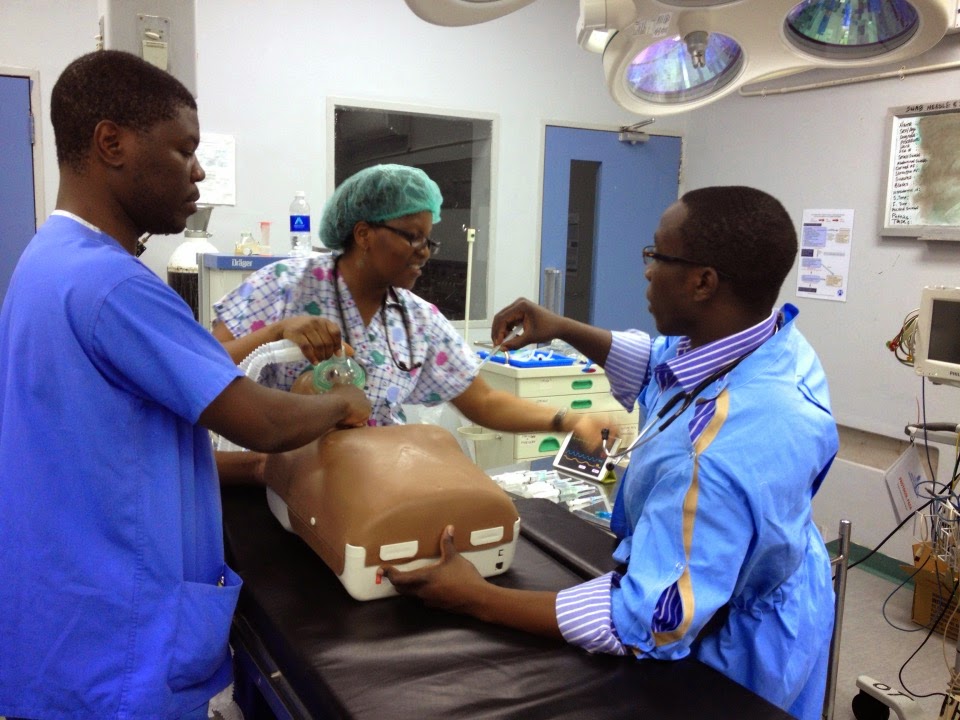I was very excited to come back to see how ZEST: Zambian Emergency Simulation Training was going. Simulation is a mode of teaching we use a lot in anaesthetics and medical education in the UK but its a fairly new concept in Zambia. It was first set up by David and myself as a vital means to teach MMed students about emergency clinical situations (some that don't occur that often in practise) which they might face but in a safe environment.
The name was basically derived as an acronym however it also doubles up as the ZEST of a lime - a refreshing twist on medical education. Not to be confused as a lemon... we wouldn't want people thinking we were calling them lemons!
So we first conceived the idea as we stumbled upon a pretty well stocked up medical students simulation room in the University across the road and with a little negotiation we got the go ahead to hold a sim session there monthly. This was great and certainly kick started our sessions of a simulation scenario followed by a consolidation lecture/presentation.
 |
| Simulation lecture in old simulation classroom |
 |
| Simulation scenario with the then 3rd year MMeds in old simulation classroom |
Since I've left things have blossomed. After holding the SAFE Obstetrics course the simulation mannequins have been left in UTH awaiting the next course but they have very kindly allowed us to use them meanwhile to teach the MMeds as a part of ZEST. So the sessions are now held in theatres and are definitely far more real time.
 |
| Simulation set up with ipad as a monitor and equipment and syringes out as per usual set up |
Its amazing how you can recreate the anaesthetic monitor from an app on the mobile phone and control the display from it on the ipad via blue tooth! In fact we can even supply the MMeds with carbon dioxide monitoring (which we have yet to get in real life out here) so that they at least get to become familiar with it for when they do.
 |
| Giving a patient (ok, well a torso) some oxygen before starting the process of intubation |
 |
| Mid intubation |
Its great fun to teach. It does involve a bit of preparation work - both writing the scenarios to run and also setting up the theatre to make it more 'real'. However the Zambians are born actors. They are absolutely fantastic at role play and have no qualms whatsoever in standing up and doing this straight off the bat - which is in contrast to many trainees in the Uk from my observation who are certainly more shy about a thespian performance! Some of their mimicing of fellow colleagues/allied health professional are so real it makes one half believe that they are actually in the room themselves!
 |
| Having successfully intubated, considering the further options |
So this week was a difficult case of asthma which didn't get better despite maximal treatment and needed to have an anaesthetic to go to intensive care unit. It involved not only timely identification of the problem but also the management steps and also the logistical steps of what to do and more importantly how to do it out here (like setting up a nebuliser - most had no idea - again I suspect there would be a few red faces in the Uk at this request!) The other was a young lad who was undergoing a fixation of his leg and ended up getting a fat embolus. The good news about all of these is that we can manipulate and control all the vital parameters and if the trainees intervene appropriately the patient can improve, if they dont act in a timely fashion there is deterioration - so it really is a great way to teach thinking and doing under stress!
I'm hoping to do quite a few more of these sessions whilst I'm here as they are not only of great benefit to the trainees but they are immensely good fun to teach! And certainly a breath of fresh air from a warm lecture room!
The future plans and aspirations will be to try and get some multidisciplinary sessions developed - be that with theatre nursing and porter staff or allied surgical specialties. This way team working especially in times of crisis will be well attended to. Watch this space, who said you cant have your cake and eat it?!

No comments:
Post a Comment